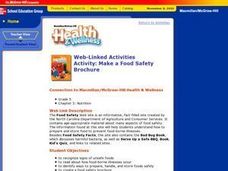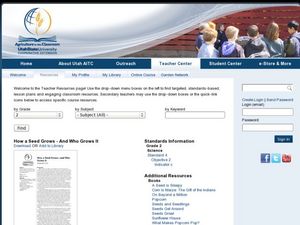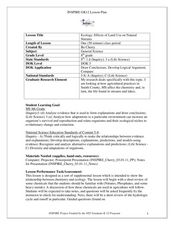Curated OER
I Don't Think We're in Kansas Anymore (Grades 2-5)
Students give examples of erosion and weathering processes. They determine causes of America's Dust Bowl phenomena.Students define erosion as the condition in which the earth's surface is worn away by the action of water and wind.
Curated OER
Make a Food Safety Brochure
Students create brochures that inform their families how to prepare and store food to prevent food-borne illnesses. They research food safety facts and proper food-handling techniques on the internet.
Curated OER
Got Water?
Young scholars determine that delivering clean, fresh water to citizens around the world involves and affects politics, economics, international relations, and technology. They brainstorm a list of factors that might affect their town's...
Curated OER
Recycling
In this recycling activity, students review what items can be recycled, what is made from recycled items, and how recycling conserves resources. This activity has 5 word scramble, 10 short answer, and 5 multiple choice questions.
Curated OER
The Work Place Vocabulary
For this Language Arts instructional activity, students discover the definitions to 15 vocabulary words related to the work place. The list of words includes boss and cafeteria.
Curated OER
Advanced Critical Reading: Colony Collapse
In this critical reading learning exercise, students read a passage about the collapse of bee colonies and then answer questions based on the reading.
Curated OER
Civilization Pie
Students define civilization as it was in ancient times. In this world history lesson, students work in small groups to write a recipe that has all the combined ingredients of early civilized societies and share their results with...
Curated OER
Kernel Power" Ethanol Fuel from Corn
Students study why corn is a biodegradable, renewable resource. For this ethanol lesson students build models and observe a chemical reaction.
Curated OER
Coming to America: A Look at Colonization in the 1600s
Students analyze the European colonization of America. In this colonial America instructional activity, students use provided Internet resources to research colonization and representative government. Students...
Curated OER
A State Divided - Maryland in the Civil War Era
Students use primary sources to see how Maryland was a divided state during the time leading up to the Civil War. In this Civil War lesson plan, students go over vocabulary, and look at maps that show the division of opinions of people...
Curated OER
What's Holding Up the Water?
Students read about the history and locate dams in Arizona. For this Arizona dams lesson plan, students write a summary about what they read focusing on word choice, ideas, conventions, and geography content.
Curated OER
A River Through Time
Students explore how construction of a dam on the Gila River affected the lifestyle of Pima Indians. In this social studies instructional activity, students locate the Gila River and the Coolidge Dam. Students record dates on a timeline...
Curated OER
How a Seed Grows: And Who Grows It
Second graders explore botany by viewing video clips in class. In this seed growth lesson, 2nd graders identify the types of seeds that grow specific plants and what the optimal conditions are for growing seeds. Students view a video...
Curated OER
Hispanic Heritage Month Lessons
Celebrate Hispanic Heritage Month by learning about history, culture, art, food, and civil rights.
Curated OER
The Trail of a Snack Food
High schoolers identify some of their favorite snack foods. Using this information, they discover the resources needed to produce the food. In groups, they research different alternatives to make their favorite food in order to protect...
Curated OER
Determining Point of View
Students examine web sites to determine point of view and bias in information sources. They determine the usefulness of information based on these biases or limitations.
Curated OER
Ecology: Effects of Land Use on Natural Streams
Eighth graders examine how humans affect various ecosystems. In this ecology activity, 8th graders discuss different ways that contaminants enter the stream. They explain the consequences of eutrophication in lakes.
Curated OER
Eggstra Safe Eggs
Pupils study about the bacteria that grow in eggs. They examine what farmers do to keep eggs safe such as providing clean environments in the chicken house.
Curated OER
Bank On It! Ancient Farming
In this ancient farming worksheet, students fill in the blanks in 25 sentences about farming in Mesopotamia. Students will use the words in a word bank. Prior knowledge or research will be needed.
Curated OER
Sustainable Dining
Students identify consumer products and sustainable foods. They calculate the differences in prices and applying those prices to the cost of a meal. They also discuss the costs and benefits of buying sustainable products.
Curated OER
When Is a Pest an Insect?
Young scholars view the importance of insects as pollinators. They are now posed with the problem--those insects are nice--but insects are pests right? Students explore their description of pests and pesticides.
Curated OER
Learning about Biotechnology and GMO’s
Tenth graders describe the different methods of biotechnology. In this biology lesson, 10th graders assess the pros and cons of using GMO's. They create posters that either supports or discourages its use.
Curated OER
The Original Layout of the Town of Deerfield
Eleventh graders explain that elements of the early settlement of Deerfield can still be seen in the town layout and in some of the early 18th century houses which survive. They read and analyze historical maps and analyze a drawing of...
Curated OER
Healthy People 2010
Ninth graders log on to the attached website. They use the "Online Slide Show" and think about the questions in the guide. They complete the slide show and guide, then and share their suggestions with the class.

























